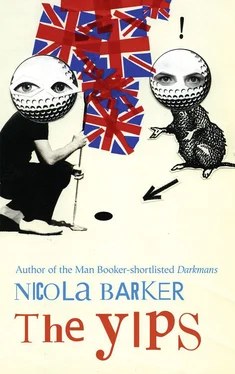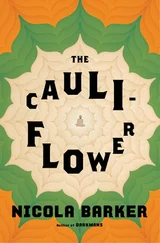Nicola Barker - The Yips
Здесь есть возможность читать онлайн «Nicola Barker - The Yips» — ознакомительный отрывок электронной книги совершенно бесплатно, а после прочтения отрывка купить полную версию. В некоторых случаях можно слушать аудио, скачать через торрент в формате fb2 и присутствует краткое содержание. Год выпуска: 2012, Издательство: Fourth Estate, Жанр: Современная проза, на английском языке. Описание произведения, (предисловие) а так же отзывы посетителей доступны на портале библиотеки ЛибКат.
- Название:The Yips
- Автор:
- Издательство:Fourth Estate
- Жанр:
- Год:2012
- ISBN:нет данных
- Рейтинг книги:4 / 5. Голосов: 1
-
Избранное:Добавить в избранное
- Отзывы:
-
Ваша оценка:
- 80
- 1
- 2
- 3
- 4
- 5
The Yips: краткое содержание, описание и аннотация
Предлагаем к чтению аннотацию, описание, краткое содержание или предисловие (зависит от того, что написал сам автор книги «The Yips»). Если вы не нашли необходимую информацию о книге — напишите в комментариях, мы постараемся отыскать её.
The Yips — читать онлайн ознакомительный отрывок
Ниже представлен текст книги, разбитый по страницам. Система сохранения места последней прочитанной страницы, позволяет с удобством читать онлайн бесплатно книгу «The Yips», без необходимости каждый раз заново искать на чём Вы остановились. Поставьте закладку, и сможете в любой момент перейти на страницу, на которой закончили чтение.
Интервал:
Закладка:
She gazes at herself for a fleeting moment, shocked, then quickly turns away, slaps the book shut and tosses it (almost guiltily) back into the box. Three seconds pass before she is carefully retrieving it, straightening the dust jacket, lifting her black shirt and shoving it, furtively, into the waistband of her trousers (quickly yanking her priestly raiment back into place again).
She now pushes the first box aside and delves into the one that sits directly to its left (written across the lid — in heavy, blue marker this time — is ODDS AND SODS ). From the top of it she withdraws an old altar cloth (partially destroyed by moths) and a folded-up child’s duvet cover with matching pillow in the design of a racing car. Under these are four cuddly toys: a bear without a head, a felt elephant with its ears partially chewed off, a somersaulting dog with the springs dangling from its battery compartment and a duck.
Under the toys are two plastic bags, one containing Stickle Bricks, the other, Lego and part of a small train track. Next she withdraws three books. The first two (one is Gaskell’s Life of Charlotte Brontë , the other an old, obtuse-seeming hardback called Synonyms Discriminated ) she hurriedly puts to one side, the third she inspects the cover of and then clucks her satisfaction at the title before resting her back against a large, empty Calor Gas bottle and starting to page through it.
She pauses at the beginning of Chapter Three, her eye momentarily distracted by something: a tiny silver sequin, squeezed by the urgent push of alternating pages into the book’s yellowing spine. She pulls it out, inspects it for a second, then drops it, carelessly, into her lap.
Her eye focuses on the chapter’s opening paragraph: ‘ Behind the layers of ambiguity and dissonance the agoraphobic longs for meaningful and rewarding involvement in the outside world. This may mean that there were lapses and breaches in her early feminine training that make it difficult for her to accept the renunciations usually accepted by women …’
As she reads, she slowly becomes aware of a slight commotion outside. She lifts her head and listens, scowling, gradually discerning the soft purr of an engine idling in neutral, the occasional clank of metal against railings interspersed by snatches of conversation and the jarring blurt of music from a phone.
She flares her nostrils, irritated, and returns to her book again, turning back a few pages, her eye settling on a paragraph that has been underlined in soft, dark pencil by the book’s previous owner: ‘ Although she did succeed in masking it, underneath she was seething with rage at the injustice done to her. It was the emergence of these feelings that she feared in subsequent social situations, as well as the fear of more injury, that turned her into a recluse …’
The engine — having idled temporarily — now roars back into life, brakes squeal and then the engine idles once again to accompanying laughter.
‘ The most dangerous place for women, ’ she reads, ‘ is in their own homes. One cannot read a newspaper without realizing the dangers of the street, yet social scientists have known for years what the public resists: the greatest danger is from “loved ones” and others whom we know …’
More engine noise, high-pitched female giggling, then (and this is the deal-breaker) the sound of breaking glass. Sheila springs to her feet and charges outside. She belts across the back garden, jinks through a specially engineered tear in the fence, expertly sidesteps a hodge-podge of small graves and ends up hard against the black, wrought-iron fence that shelters the churchyard from the road beyond.
As she draws to a sharp halt, the poetry book — currently having slipped down to thigh-level — travels still further down her trouser leg, resting, momentarily, at her knee.
Three Asian boys and one girl appraise her, quizzically.
‘Sorry to be a party-pooper,’ Sheila huffs, observing a broken cider bottle on the pavement while bending down and feeling for the book, ‘but I’m afraid the fun stops here.’
The quizzical appraisal continues, then one of the boys — the one standing on the pavement with the girl (the other two are in the car; an old, brown Honda with gold hubcaps and darkened windows) — smirks, dismissively, ‘We weren’t having no fun, missus …’
He turns to the girl. ‘Was you havin’ any fun?’ he enquires, cordially.
‘Nope,’ the girl says, shrugging.
‘You sure about that?’ the boy in the passenger seat asks.
‘Yeah,’ she confirms. ‘It’s been total crap. One of the crappiest ever , in actual fact.’
‘ That bad?!’ The first boy looks slightly put out.
‘On my mother’s life!’ She nods.
‘Her mother’s a zombie!’ the kid in the passenger seat guffaws.
‘No she ain’t!’ the girl squeals, shrilly.
‘Her mother’s Freddie Kruger!’ the passenger kid rejoins, then a series of baroque, Freddie Kruger impressions are enacted while the lone girl bleats her protest.
Sheila has a momentary inkling that she might be in imminent danger of losing her moral authority (if, indeed, she had any to begin with), so she does the first thing that enters her head — she starts singing.
‘ Once in Royal David’s city
Stood a lowly cattle shed,
Where a mother laid her baby
In a cradle for its bed …’
Sheila does not have an especially good singing voice, but it is strong — some might even call it ‘strident’. The kids stop their zombie impressions and turn to appraise her again, surprised.
‘ Mary was that mother, mild, ’ Sheila sings, undaunted,
‘ Jesus Christ her little child. ’
As she quickly inhales between verses, the kids exchange glances.
‘That definitely ain’t no recording voice,’ the first boy mutters.
‘Are yous a nun?’ the girl asks.
‘A nun?’ Sheila echoes. ‘No.’ She shakes her head. ‘I’m actually …’ She falters for a second, then smiles. ‘I’m a guard dog.’
She points to the church: ‘My kennel.’ She grins.
‘You’re weird,’ the kid in the passenger seat mutters.
‘Woof!’ Sheila says, nodding.
‘What’s wrong with your leg?’ the first boy demands (Sheila keeps reaching her hand down towards her knee to try and dislodge the book).
‘Woof!’ Sheila answers, shaking her leg so that the book falls out from the bottom of her trousers. She bends over to pick it up then holds it out to her audience. ‘Woof! Woof! Woof-woof woof, Woof woof!’ she explains (‘It’s a poetry book, stupid!’ in canine-lingo).
As she barks, the boy in the passenger seat receives an SMS on his phone. ‘Musa’s at the Galaxy!’ he yells. The kids on the pavement dive into the back of the car.
‘Woof woof!’ Sheila barks, waving jauntily as the car U-turns and roars off.
From the corner of her eye she sees an elderly neighbour walking down the opposite pavement towards her.
‘Bye bye!’ she effortlessly translates into English, still waving. ‘God bless! Have fun at the Galaxy!’
She beams at the neighbour. ‘Good evening, Mrs Malmouth!’ she trills. ‘Beautiful weather! Incredibly balmy!’
Then she turns and scuttles off, eyes rolling, horrified, poetry book clutched — like a piece of defensive armour — against her breast.
Valentine is carefully transporting a glass of warm, malted-chocolate milk along the softly lit, blue and brown-tiled hallway to her niece, upstairs. She is wearing a pair of men’s silk boxer shorts (in mint green) and a tight, black, cotton vest with a tiny, black and green silk kimono thrown over the top. On her feet are a pair of black flip-flops with strange, three-inch-thick rubber soles. Her hair is swept up into a ponytail and the fringe into a quiff. Virtually her entire face (excluding eyes, lips and nostrils) is smothered in a smooth, gently browning paste of crushed avocado.
Читать дальшеИнтервал:
Закладка:
Похожие книги на «The Yips»
Представляем Вашему вниманию похожие книги на «The Yips» списком для выбора. Мы отобрали схожую по названию и смыслу литературу в надежде предоставить читателям больше вариантов отыскать новые, интересные, ещё непрочитанные произведения.
Обсуждение, отзывы о книге «The Yips» и просто собственные мнения читателей. Оставьте ваши комментарии, напишите, что Вы думаете о произведении, его смысле или главных героях. Укажите что конкретно понравилось, а что нет, и почему Вы так считаете.












